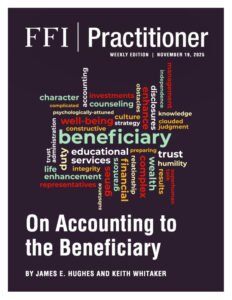
View this edition in our enhanced digital edition format with supporting visual insight and information.
In this week’s edition of FFI Practitioner, FFI Fellow James E. Hughes, Jr., and Keith Whitaker consider the responsibilities of a trustee to a beneficiary. They reflect on the multiple meanings of “accounting” to the beneficiary, as well as what it means to enhance a beneficiary’s well-being.
Among the many duties of a trustee, the duty to account does not seem as illustrious as, say, the duties of loyalty or impartiality, nor has it generated the debate that the duty to manage the trust’s funds in a prudent manner has. But the duty to account is central to a trust and, we would argue, will become only more central as grantors and trustees follow recent trends to make sure that trusts “enhance” beneficiaries’ “well-being.” These trends raise the question of how trustees should account to their beneficiaries.
Why is the duty to account central to a trust? Most simply, because a trust is not a gift. A gift becomes the property of the recipient. As a result, it requires no accounting from one person to another. A trust is very different. Trust funds do not become the property of the trustee to enjoy, nor are they simply the beneficiary’s. They are placed in the trustee’s hands, as a trust, for the benefit of the beneficiary. Without the duty to account, there would be no way for the beneficiary to know if the trustee were fulfilling the trust. Without accounting, there is no trust.
It can be complicated to figure out to whom the trustee must render his or her account, especially when beneficiaries are minors or disabled, or in complex trusts or “silent” trusts. Still, in all these cases, there remains a duty of the trustee to account to someone.
Today trustees are often being asked to play a role in preparing beneficiaries to live well with wealth. Delaware has approved “well-being trusts.”1 Boutique trust companies offer beneficiaries educational services and “independence trusts.”2 Retail trust companies even claim to help prepare “the rising generation.”
If “life enhancement” is on the table, how can a trustee account for attempts to fulfill this purpose?
It helps to step back and recognize that, traditionally, the answer has been financial: the trustee accounts for his or her financial management of the trust funds. That may mean sending the beneficiary (or the beneficiary’s representatives) a monthly, quarterly, or at least annual custody statement for the trust. It may mean preparing the trust’s annual profit and loss statement and balance sheet for the beneficiary.
There is wisdom in this answer. A trust entrusts financial assets. No money, no trust, no beneficiary, no trustee. If trustees fully and conscientiously helped beneficiaries understand trust finances in a timely fashion, many problems in trust relationships would be avoided.
Still, trustees who see themselves as accountable for the financial management of the trust cannot ignore that the trust is for the benefit of a human being. The trustee will take into account the beneficiary’s age, stage of life, and likely needs at that stage (such as buying a house or caring for children). These human considerations will naturally form part of the trustee’s account of financial management of the trust.3
Such trustees may also consider themselves accountable for arranging a beneficiary some instruction in wealth management and money skills, financial literacy and acumen, understanding of business management and entrepreneurship, and knowledge of philanthropy.4 This effort implies the belief that a beneficiary, as a member of a wealthy family, would do well to possess these skills, even if the beneficiary has a trustee overseeing matters.
Likewise, a trustee knows that a beneficiary comes from a family whose values, governance system, and dynamics will likely influence the success or failure of the trust in the beneficiary’s life. In this case, the trustee may hold him- or herself accountable for making sure that the beneficiary is educated about these matters, including the grantor’s wishes or purposes in setting up the trust.5
Financial disclosures, training in financial literacy, and education about family wealth may all be part of the trustee’s duty to account to the beneficiary. But they sound rather modest compared to “life enhancement.”
But to truly account for the beneficiary’s well-being sounds like a superhuman task. Who is this trustee, who can say what well-being is for this human being, what can be done to increase it, and who should be hired to do so?
No matter what professional skill a trustee has, one must enter into such a vast endeavor with humility. “First, do no harm.” Even the most thoughtful plans can lead to unexpected, unwanted results when dealing with something so varied as human well-being. Proceeding humbly is part of a trustee’s care.6
Also, whenever we assess our own accountability, we run the risk of clouded judgment, of exaggerating our powers or minimizing the obstacles. For example, between genes and culture, many parents feel that their words or deeds may have little effect on their children’s characters. They may underestimate themselves. But the effect of a trustee will likely be even weaker.
Trustees are uniquely situated to recognize the negative effects that trusts can have on beneficiaries’ lives. Based on that knowledge, a trustee may hold her- or himself accountable to talk through some of these issues with willing beneficiaries, offering supportive words and constructive examples.7 But even the most psychologically-attuned trustee knows that this effect must be limited. If a beneficiary is truly struggling with mental health, the best thing most trustees can do is to ensure that the trust’s funds are used to get the beneficiary competent counseling.
In the spirit of humility, then, it’s fair to say that only with certain beneficiaries will trustees be able to give an account of themselves that goes beyond the financial management of the trust. And even with such beneficiaries, the “accounting” looks more like ongoing conversation than an annual report.
For example, some trustees use instruments such as Wise Counsel Research’s Family Balance Sheet to measure the beneficiary’s skills and knowledge, identify strengths and weaknesses, and create a plan to reinforce the strengths and fill in the gaps. This is an excellent way to quantify beneficiary well-being.8 Such instruments produce the most lasting improvements when beneficiaries spend the time to understand the measurements, prioritize their goals, and hold themselves accountable.
Even simpler as a method for taking account of the trust relationship are the questions that we ask beneficiaries when we meet: “How are you doing?” and “How can I help?” These questions inevitably get at how the trust is enhancing, or detracting from, the beneficiary’s life.
A truly powerful question of accountability is “If the trust terminated today, could the beneficiary receive the funds into his or her life with integrity?” A trustee should try answering that question for each beneficiary. Then ask them. Perhaps one would respond, “What do you mean, ‘with integrity’?” In such a case, a fine counter-response would be, “What does it mean to you?”
One more way for trustees to hold themselves accountable to beneficiaries is to remember the role of time in the trust relationship. This means honoring their maturation. Adult beneficiaries should know that they will be treated like adults, provided with appropriate information, and given the opportunity to ask questions. And, by a certain point of maturity, and with some life experience (say, at age thirty or thirty-five), set the expectation that the beneficiaries will be treated something more like co-trustees. This expectation does not relieve the trustee of any duties. It does provide a goal. The trustees can then hold themselves accountable for pursuing this goal.
As these examples indicate, a trustee’s duty to account is not fulfilled in a semi-regular email that encloses the trust’s custody statement. Nor is it fulfilled by meeting once a year with the beneficiary at 11:30 a.m., breezing through the trust’s financial statement, and then hurrying to a noontime lunch. Instead, we encourage trustees and beneficiaries to structure their meetings (at least twice a year), with attention to 1) life enhancement (including distributions), 2) trust investments, and 3) trust administration—in that order, an order that reflects the trustee’s “account” of their priority.
A trustee must not make money less important than it is—it is the substance of the trust. But one must also not make it more important than it is. Just because the trustee holds a trust, and it amounts to a lot of money, does not make the trustee “accountable for” the beneficiary’s well-being. Many other, larger factors—such as family, school, friends, media, and faith—shape the beneficiary’s character and well-being. Within the limitations of time, knowledge, and proper humility, if the trustee can enhance the beneficiary’s life, this is a worthy endeavor, suitable to hold oneself accountable for—an activity less belonging to financial management than to care.
References
1 See this discussion of the well-being trust statute at the UHNW Institute.
2 See, for example, Lineage Trust.
3 For more on what taking into account the human realities of the beneficiary’s life, see Stephen Goldbart, et al., A 10X10 Learning Roadmap (James E. Hughes Foundation, 2024).
4 See Delaware “well-being trust” statute, Section 3345(b)1.
5 See Delaware “well-being trust” statute, Section 3345(b)2.
6 For more on care in the trust relationship, see James E. Hughes, Jr., and Keith Whitaker, “Building a Culture of Care in Trusts,” Parts I and II (FFI Practitioner, 2025).
7 For examples, see Hartley Goldstone and Kathy Wiseman, TrustWorthy: New Angles on Trusts from Beneficiaries and Trustees (Trustscape LLC, 2012).
8 For more on the “five qualitative capitals,” their meanings, and the research behind their definitions, see www.wisecounselresearch.com.
About the Contributors
 James E. Hughes, FFI Fellow, is the author of Family Wealth: Keeping It in the Family, and of Family: The Compact Among Generations, as well as co-author of many books in the field of family wealth. Jay was the founder of a law partnership specializing in the representation of private clients. In 2021, The James E. Hughes, Jr. Foundation (www.jehjf.org) was founded in Jay’s honor. He can be reached at contact@JEHJF.org.
James E. Hughes, FFI Fellow, is the author of Family Wealth: Keeping It in the Family, and of Family: The Compact Among Generations, as well as co-author of many books in the field of family wealth. Jay was the founder of a law partnership specializing in the representation of private clients. In 2021, The James E. Hughes, Jr. Foundation (www.jehjf.org) was founded in Jay’s honor. He can be reached at contact@JEHJF.org.
 Keith Whitaker, PhD, is the founding director of Wise Counsel Research Foundation. An educator who consults with leaders and rising generation members of families with significant wealth, he also serves select families as an independent trustee. He can be reached at keith@wisecounselresearch.com.
Keith Whitaker, PhD, is the founding director of Wise Counsel Research Foundation. An educator who consults with leaders and rising generation members of families with significant wealth, he also serves select families as an independent trustee. He can be reached at keith@wisecounselresearch.com.

View this edition in our enhanced digital edition format with supporting visual insight and information.





